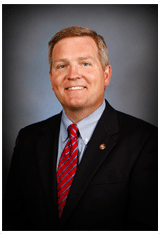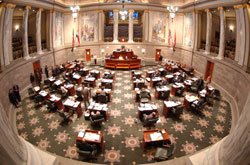JEFFERSON CITY, Mo. — Senate Bill 437, the higher education funding formula bill, was perfected Wednesday after the Senate spent the larger portion of the morning and part of the early afternoon debating multiple proposed changes.

The bill’s sponsor, Sen. David Pearce, R-Warrensberg, had little issues with the majority of the amendments which were offered during floor debate, including one amendment by Sen. Eric Schmitt, R-Glendale, that created somewhat of an exception for Truman State University by classifying it as part of a separate peer group.
The amendment, which passed 16-11 after Schmitt called a standing division from what he thought was a too-close voice vote, places Truman State into a peer group category of its own, rather than with the majority of the other universities.
During the debate, Sen. Kurt Schaefer, R-Columbia, expressed concern that the amendment creates a carve-out for the university by allowing them to not be subjected to the same formula as the rest of the institutions. Schmitt addressed Schaefer’s concerns by pointing out the University of Missouri system, which has a campus in Schaefer’s district, requires a separate peer group because of the degree of difference in certain operations, such as research.
Another peer group exception is Linn State Technical College, which the bill sponsor pointed out doesn’t fit with the four years, but also isn’t a community college, so it stands alone.

“This is not about carving out anyone,” Schmitt told The Missouri Times. “Truman has a statewide mission, and it’s the only highly selective liberal arts university. This is about adding to the dialogue, and acknowledging their hard work.”
Another amendment, sponsored by Sen. Brad Lager, R-Savannah, that deals with job creation incentives came to the floor and was adopted.
According to the language, ten percent of each institution’s funding would be designated as “career placement incentive funding” to motivate universities to satisfy the career placement rates established by the Department of Higher Education. The amendment charge the Department to come up with a system to track and verify that data by July 1, 2014.
By a voice vote, the amendment was adopted.
The bill currently is not on the calendar for third reading.
For more information about SB437 and to better understand what the different institutions and their associations think about it, check out last week’s in-depth story.
Ashley Jost is no longer with The Missouri Times. She worked as the executive editor for several months, and a reporter before that.



